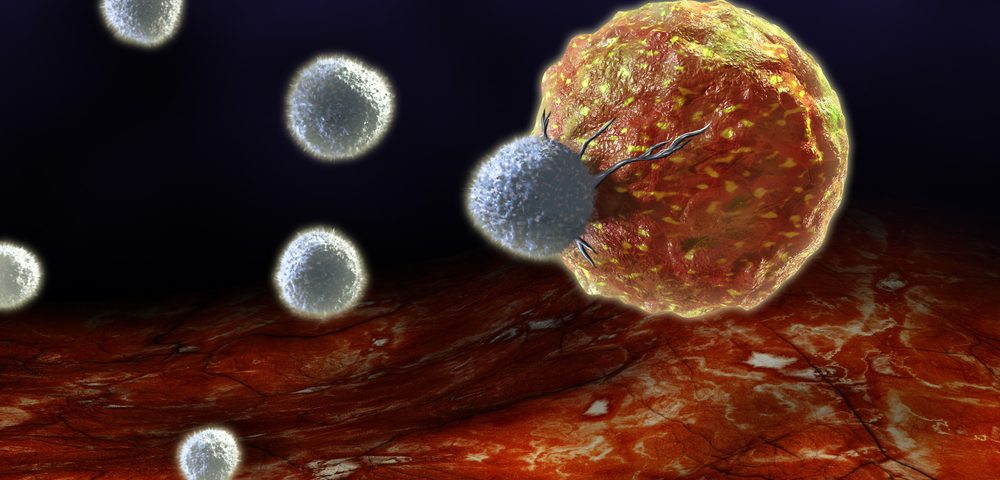Immunovative Therapies has started a Phase 2b clinical trial to evaluate its cancer vaccine CryoVax as a third-line therapy for patients with metastatic colorectal cancer who are refractory to chemotherapy. The trial has already dosed its first patients, and enrollment is expected to be completed by the end of July 2017.
The prognosis for patients with metastatic colorectal cancer (mCRC) is very poor. Despite recent advances in the treatment of chemorefractory mCRC, approved drugs have just modest effectiveness and are often accompanied by significant side effects.
Immunotherapy with immune checkpoint inhibitors has emerged as a efficient therapeutic approach for a subset of melanoma and cancer, and is showing promising results in multiple other cancers, but that does not seem to be the case for mCRC patients.
This is because immune checkpoint inhibitors work by removing the brakes of the immune cells, allowing them to efficiently recognize and kill tumor cells, but require that the tumor is enriched in tumor-killing immune cells in the first place.
In mCRC, this is only the case in patients whose tumors are highly mutated, which accounts for about 15 percent of all mCRC cases. In these patients, the highly mutated tumors induce an immune response which results in tumors becoming highly infiltrated with immune cells (known as “hot” tumors).
Treating these patients with immune checkpoint inhibitors effectively activates these immune cells to recognize and attack the tumor cells, preventing immune evasion.
CryoVax is a new generation immunotherapy designed to treat the 85 percent of patients with mCRC who do not respond to immunotherapies. It is an in-situ, personalized, anti-cancer vaccine that combines cryoablation of a selected tumor lesion followed by the intra-tumoral injection of AlloStim, meant to generate hot tumors in such patients.
First, CryoVax requires that patients are treated with a technique called cryoablation, which kills cancer cells with extreme cold. This leads to the release of the inner contents of the tumor cells, such as heat shock proteins, that can be recognized as tumor antigens by immune cells.
But these patients have low levels of immune cells in their tumors, which are overcome with the intratumoral injection of AlloStim cells into the cryoablation lesion. AlloStim cells are healthy but intentionally mismatched donor cells that induce a strong immune response, recruiting immune cells to the tumor and creating hot tumors.
After reaching the tumor, the immune cells not only eliminate the AlloStim cells (because they are mismatched and recognized as foreign), they also uptake the tumor antigens left in the tumor microenvironment by the cryotherapy and become specific to tumor cells.
Subsequent intravenous injections of AlloStim are believed to create highly inflammatory conditions, which naturally reduced the production of checkpoint molecules on tumor cells.
By creating hot tumors and decreasing checkpoint molecules in tumor cells, the combination enabled the immune-mediated tumor killing of mCRC tumors.
“Anti-tumor vaccines have had difficulties in translating into effective therapies in the clinic and mCRC has been particularly resistant to immunotherapy,” Dr. Michael Har-Noy, CEO of Immunovative Therapies and inventor of the CryoVax anti-tumor vaccine regimen, said in a news release.
“The CryoVax vaccine regimen has a unique mechanism of action and shows promise as a next generation immunotherapy. We will be studying various AlloStim dosing frequencies and closely monitoring the interaction of host immune cells with the tumor cells in each of the cohorts of this clinical trial. This information should serve to determine if this customized in-situ vaccine approach will benefit mCRC patients.”
The Phase 2 trial (NCT02380443) is expected to enroll 18 patients, with three patients in six groups (A through F) who will receive different dosing schedules of AlloStim. Participants are required to undergo multiple biopsy and computed tomography (CT) scan procedures and provide blood samples over time to study how mCRC tumors change their interactions with the immune system.
“Response to chemotherapy treatments relies upon evaluation of changes in tumor size, however, often it is difficult to evaluate response to immunotherapy using these techniques,” said Madappa Kundranda, MD, PhD, the principal investigator of this study.
“Immune responses can result in swollen tumors that appear larger but actually contain decreased tumor burden, initial pseudo-progression followed by response sometimes even months later, or stable disease that translates to increased survival,” Kundranda said.
“The incorporation of sophisticated immunomonitoring exploratory endpoints and longitudinal biopsies and CT scans taken simultaneously in the trial design provides an unprecedented opportunity to understand the immune mechanisms involved in mCRC and to learn how different frequencies of CryoVax vaccine administration affects these parameters.”
“We are confident that this trial will significantly add to our knowledge regarding the interaction of the immune system with chemotherapy-resistant tumors,” Kundranda added.
The Phase 2b clinical trial is being conducted by Banner MD Anderson Medical Center in Phoenix, Arizona, a partner of MD Anderson Cancer Center in Houston, Texas. Recruitment is underway.


